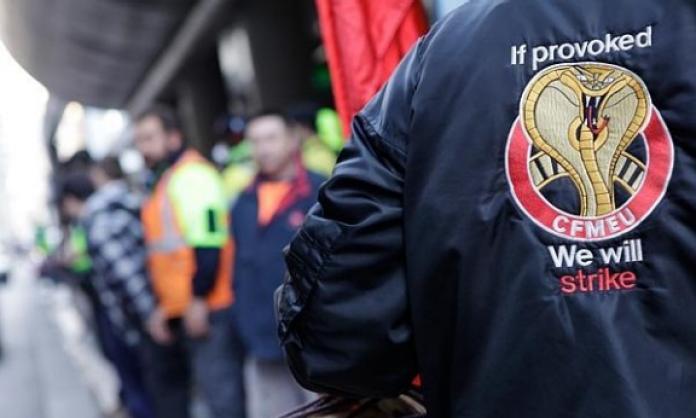Listen to the Coalition squeal like stuck pigs when the incoming ACTU secretary Sally McManus dares to state the bleeding obvious: unjust laws should be broken in the fight for social justice.
Employment minister Michaelia Cash said that McManus’ comments were “outrageous”.
Environment and energy minister Josh Frydenberg declared: “I have no sympathy with the idea that you should break the law of the land in order to pursue your political objectives. I think the head of a union organisation … should be encouraging everyone … to abide by the law and anything other than that, really, is unacceptable”.
You’ve got to be kidding me. This is the Coalition, right? The government that is riddled with ministers and ex-ministers – including the aptly-named Cash – who “forget” to declare their investment properties? The politicians who loot the public purse for travel, accommodation and entertainment expenses claims? Those whose mates in the NSW branch of the Liberal party were forced to resign in droves by ICAC for their corrupt dealings?
Oh yes, the Coalition’s hands are clean, they’re pure as the driven snow.
And these breaches of the law are trivial compared to their broader political crimes. Frydenberg says that people shouldn’t break the law to pursue their political objectives? So, what was John Howard doing when he flouted international law and took Australia to war in Iraq in 2003? What is every Australian immigration minister doing when they spit on international law and incarcerate asylum seekers in offshore detention centres?
It’s not just that these scumbags repeatedly break the law in pursuit of their own private gains and political advantage. They always go into bat for their criminal mates. Just look at Malcolm Turnbull rolling out the red carpet recently for war criminal Binyamin Netanyahu. Or Julie Bishop, who made a name for herself in legal circles leading the defence for CSR, a company responsible for killing thousands of workers by knowingly exposing them to asbestos.
Lawlessness is built into the system. This is, as McManus argued, the lawlessness of chronic underpayment of workers, exploitation of visa workers, and workplace practices that put safety and the lives of people at risk. This is not just something at the margins, but the very business model for some corporations.
In fact, if the law was just and applied fairly, any meeting of senior Liberal and National ministers would constitute a legal conspiracy in its own right – a conspiracy to defraud the public, enrich the mighty and stamp on workers.
Uphold the law? Pull the other one, it’s got bells on it.
Which laws do they want us to respect? The industrial laws that are so restrictive that they have been repeatedly condemned by international jurists as breaching international protections for workers’ rights to organise? The laws that allow bosses to shut down factories, throwing thousands of workers onto the scrapheap just so they can earn bigger profits elsewhere? Spare us the sermons about the sanctity of such laws.
How we win
Coalition MPs clearly think they’re on a winner with McManus’ comments, taking turns to try to whip up a firestorm of public indignation. They demanded Bill Shorten immediately disown her statements. Shorten obliged, primly telling reporters in his best Sunday school manner: “We believe in changing bad laws, not breaking them”.
Good god. If workers had to wait until some parliament saw fit to change bad laws there’d never be a union movement in Australia – and no cushy career for Bill Shorten either. As McManus said, every gain by workers – Medicare, the weekend, decent wages – “were all won by our parents, grandparents and great-grandparents taking non-violent, so-called illegal industrial action”.
That is exactly the record. Without the bitter struggles on the waterfront, inside the shearing sheds or on the railways in the 19th century, there would be no union movement. On every occasion, workers came up against unjust laws, written to favour the employers, and were forced to break them. The entirely illegal Eureka stockade of 1854 was central in the fight for democracy in Australia, including the right of workers to vote. The right to free speech has required a defiant and ongoing battle to safeguard it from councils and governments determined to crush it through a host of regulations and laws.
Without breaching laws restricting pickets, few strikes in Australia would ever have been successful. As FBEU NSW secretary Darin Sullivan wrote: “If firefighters didn’t break the law in 2012 [when they hosed down the NSW parliament building using their fire trucks], NSW paramedics and firefighters wouldn’t have maintained workers comp. History is full of examples where injustice has been met by resistance”.
During the civil rights movement in the US, people like Bill Shorten advised Martin Luther King to abandon “illegal” civil disobedience. Thankfully for African Americans, and indeed all of us, King rejected their urgings, telling them: “One has a moral responsibility to disobey unjust laws”.
But we all know this, don’t we? We know that the legal and political set up in this country is written to favour the rich and well-connected. We know that if we are going to win we have to be prepared to break bad laws. Without such a fight, even the few rights we have been able to win will be snuffed out. And to those like Bill Shorten we have to say, in the words of 19th century US abolitionist Frederick Douglass:
“If there is no struggle there is no progress. Those who profess to favour freedom and yet deprecate agitation are men who want crops without ploughing up the ground; they want rain without thunder and lightning. They want the ocean without the awful roar of its many waters. This struggle may be a moral one, or it may be a physical one, and it may be both moral and physical, but it must be a struggle. Power concedes nothing without a demand. It never did and it never will.”











